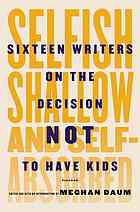
Selfish, Shallow, and Self-Absorbed
Sixteen Writers on the Decision Not to Have Kids
کتاب های مرتبط
- اطلاعات
- نقد و بررسی
- دیدگاه کاربران
نقد و بررسی

January 12, 2015
Contrary to the title, none of the 16 essays in this absorbing collection reflect particularly selfish or shallow motivations for childlessness. As Daum points out in her introduction, she and the other writers surveyed here “are neither hedonists nor ascetics,” nor “do we hate children.” Some entries are heart-wrenching—especially Elliott Holt’s “Just an Aunt”—while others are downright hilarious. Geoff Dyer announces that he’s “had only two ambitions in life: to put on weight (it’s not going to happen) and never to have children (which, so far, I’ve achieved).” He pegs the latter goal in part to his reaction to the argument that having children gives life meaning, which rests on an assumption he doesn’t share: “that life needs a meaning or purpose!” In one of the more rigorous and thoughtful essays, Laura Kipnis deftly argues that the so-called maternal instinct is really a “socially organized choice masquerading as a natural one.” Pam Houston questions the familiar social message that encourages women to “have it all” by juggling motherhood and a fulfilling career. Elegantly giving voice to her childlessness, she observes that “love, like selfishness and generosity, is not exclusive to one demographic; it infuses every single thing we do and are.”

January 1, 2015
Daum (The Unspeakable: And Other Subjects of Discussion, 2014, etc.) compiles essays from a group of noted writers-including Kate Christensen, Geoff Dyer and Lionel Shriver-holding forth on the topic of deliberate childlessness.The quality of the writing is uniformly high, but read as a whole, the pieces become repetitive and bleed into one another as the same notes are sounded over and over again. One prevalent theme concerns the oppressive conventional wisdom that holds parenting as life's most profound and worthy calling and the stigma attached to those who choose to forgo children in the interest of other pursuits. Other recurring motifs include the incomprehension of others regarding the writers' choices, the artistic sacrifices necessary for conscientious parenting, resentment of the physical demands of pregnancy and childbirth, frustration over prescriptive gender roles and the self-annihilation associated with domestic responsibilities. Thirteen of Daum's contributors are women, and three are men, but the perspectives and insights offered by all of the authors remain more or less uniform. A few of the essays touch on childhood abuse perpetrated by parents as a deterrent to procreation, but the majority cite a dedication to the writing life-and the profound disruption to that path that having children promises-as a primary motivator in remaining child-free. Regret over the decision to not have children is notably absent from the book; the authors here largely profess a sense of satisfaction and relief about the choices they have made. It's a sentiment worth considering but perhaps not 16 times in a row. Other contributors include Laura Kipnis, Sigrid Nunez, Anna Holmes and M.G. Lord. A courageous defense of childlessness and a necessary corrective to the Cult of Mommy, but Daum's collection could have benefitted from a more diverse pool of contributors and a fuller consideration of contrary opinions.
COPYRIGHT(2015) Kirkus Reviews, ALL RIGHTS RESERVED.

February 1, 2015
Author and columnist (LA Times) Daum wrote a lengthy piece about choosing not to procreate, which was published in the New Yorker in 2014; she then reached out to 16 of her fellow childless (or child-free) writers. In what occasionally feels like a bi-coastal support group, 13 women and three men discuss their feelings and experiences. The essayists all appear to come from the educated, if not the upper-middle and middle classes. Almost all of the writers go to great lengths to say that they like kids and often enjoy their company more than that of the parents (a hilarious exception is Geoff Dyer's class-warfare screed against the hyperprivileged kids in his neighborhood). Many of the women discuss proudly their abortions; several mourn their miscarriages. Of note is "Antimom," Lionel Shriver's rumination on how the "be-here-now" lifestyle could change the racial makeup of the Western world, Laura Kipnis's and Anna Holmes's takedowns of competitive mothering, and Sigrid Nunez's recounting of never feeling safe as a child. Many themes are repeated, such as the conviction that one cannot have it all--motherhood and a fabulous career. The men's contributions seem tacked on and perhaps beyond the scope of this volume, and one wonders if this collection would have been better as a TED panel discussion. VERDICT For libraries with feminist collections, for fans of the featured essayists, and for those who are considering a child-free life. The questions and answers presented here are sure to stimulate discussion and debate. [See Prepub Alert, 10/27/14.]--Liz French, Library Journal
Copyright 2015 Library Journal, LLC Used with permission.

November 15, 2014
Already stirring first serial interest, this book could stir controversy, too. Compiled by Daum, a Los Angeles Times op-ed columnist, it features essays from 16 literary stars on why they have chosen not to have children. In an age of helicopter parents, with the added notion that we really can have it all, this is a daring stance.
Copyright 2014 Library Journal, LLC Used with permission.

























دیدگاه کاربران